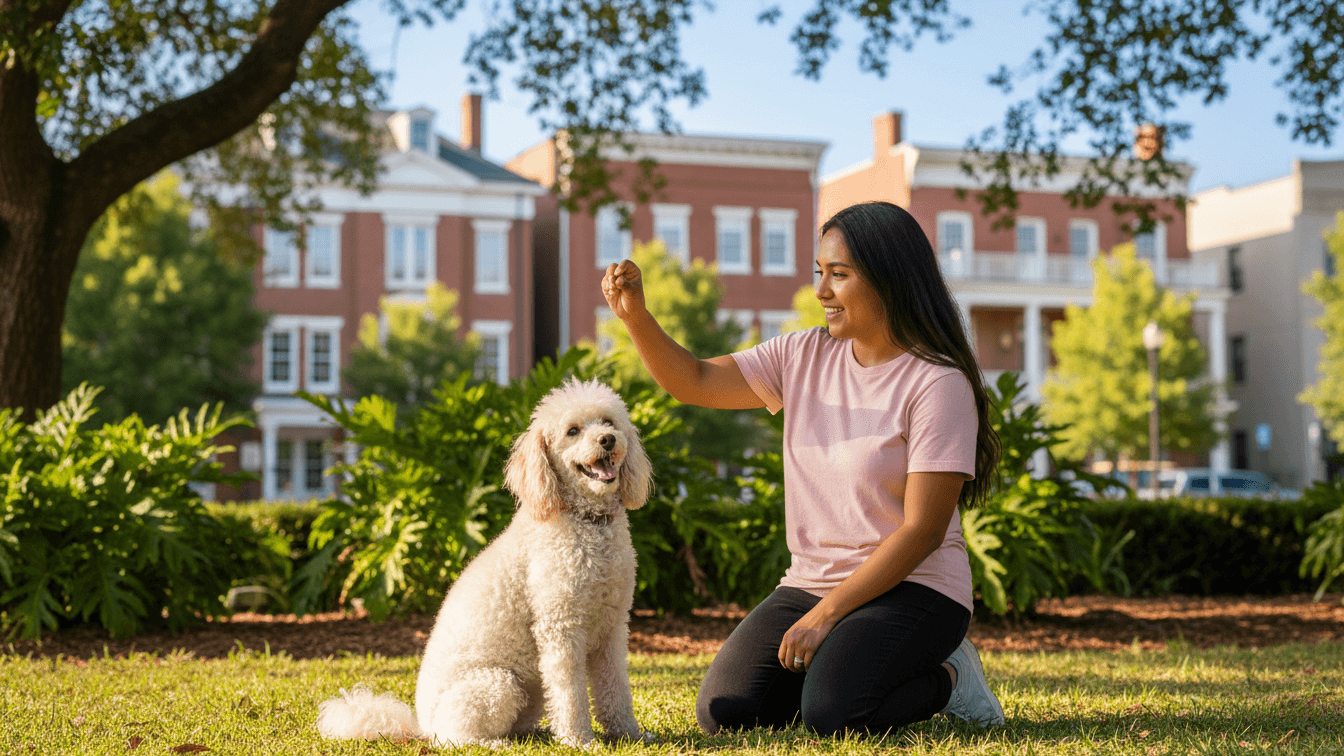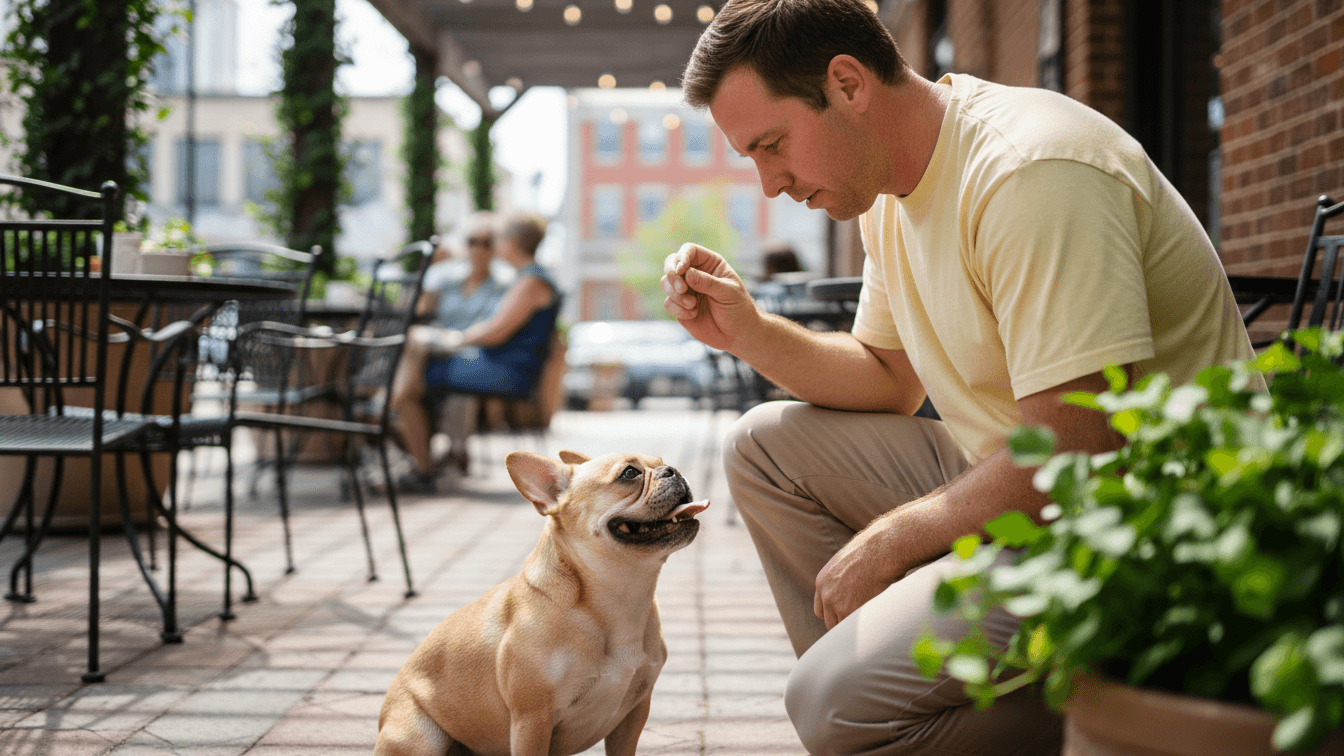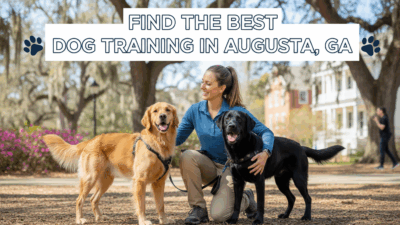Your Complete Guide to Choosing a Dog Trainer in Augusta, GA and Surrounding Areas
Living with a dog in Augusta means navigating everything from the historic neighborhoods near Summerville and the National Hills area to the bustling River Walk along the Savannah River. Your dog needs to handle it all with confidence, from loose-leash walks past street performers downtown to staying calm when you grab coffee on Broad Street or explore the trails at the Augusta Canal.
Since Augusta sits in both Richmond County and Columbia County, depending on which part of the metro area you call home, understanding local regulations helps you stay compliant while giving your dog the best training experience possible. When you find a professional dog trainer who knows these neighborhoods and their unique challenges, you’ll see better results both at home and around town.
How to Choose the Right Trainer
Start by looking for someone who uses positive reinforcement training and understands what daily life looks like in Augusta. This means your dog should learn to walk calmly along the Riverwalk, stay focused when families gather at Lake Olmstead, and handle the crowds at events like the Masters without losing their cool.
Credentials give you a quick way to compare experience levels among local trainers. Common dog trainer certifications include KPA-CTP, CPDT-KA, or IAABC-CDBC for complex behavior problems. If your dog shows serious aggression or reactivity issues, look for someone with CBCC-KA or a science-based program like CTC.
In-home dog training works great for puppy training challenges, door manners, and neighborhood leash skills right where you actually need them. Group classes make sense once your dog can focus around other dogs, especially before you try busy spots like the Saturday Market or outdoor dining areas downtown.
The best dog trainer for your situation depends on what you need to fix and where you want to go with your dog. Basic obedience training addresses everyday manners, while behavior modification tackles deeper issues like separation anxiety or fear-based reactions.
Common Dog Training Methods Explained

Reward-based methods build the trust and cooperation you want while creating lasting behavior changes. They also help you follow Richmond County and Columbia County rules about keeping dogs under control in public spaces.
Basic obedience covers sit, down, stay, place, recall, and leash training so your dog can handle walks, restaurant patios, and park visits without pulling or jumping on strangers. These foundational skills make every outing easier and safer for everyone involved.
Puppy classes focus on socialization, potty training, bite inhibition, crate comfort, and early leash manners. Starting with short, positive training sessions prevents bad habits from forming during those critical early months.
Behavior modification addresses fear, reactivity toward other dogs, resource guarding, or separation anxiety through careful desensitization and counterconditioning. For serious cases, ask if your trainer coordinates with local veterinarians to rule out medical causes.
Private lessons and in-home training let you customize everything around your daily routines, your specific neighborhood challenges, and your dog’s individual personality. Day training can speed up results when your schedule is packed and you need faster progress.
Dog training classes help your dog practice good manners around other dogs and people in a controlled setting. The best classes give dogs plenty of space, screen participants carefully, and teach calm behavior rather than just excitement and play.
Specialized training like therapy dog training or service dog training requires extra structure, public-access skills, and a very clear step-by-step training program. These dogs need to perform reliably in challenging environments, so the standards are much higher than basic obedience training.
Board and train programs can work for specific situations, but make sure you understand how the trainer will teach you to maintain the skills after your dog comes home. Without proper handoff sessions, progress can fade quickly.
Stay away from trainers who use fear, intimidation, or pain to get results. Humane methods are safer for everyone, easier to maintain long term, and much better for keeping peace with your Augusta neighbors.
Average Cost of Dog Training in Augusta, GA (Updated for 2025)
Prices around Augusta and the surrounding areas in Richmond County and Columbia County depend on the trainer’s experience, session length, and where the training happens. Here’s what most local pet owners are paying in 2025.
| Service Type | Average Cost (Augusta Area) |
|---|---|
| Puppy classes (4-6 weeks) | $140-$250 total |
| Group obedience classes (4-6 weeks) | $150-$280 total |
| Private lessons (60-90 min) | $100-$180 per session |
| In-home coaching packages (4-6 visits) | $400-$850 total |
| Day training (trainer works your dog + handoff) | $425-$900 per week |
| Behavior consult for reactivity/anxiety (initial) | $140-$240 |
| Board and train (2-4 weeks) | $1,900-$4,200 total |
You’ll probably pay extra travel fees for longer distances within Richmond County or Columbia County, and expect higher rates for complex aggressive dog training or intensive behavior work.
Make sure you understand what’s included in the quoted price, how the trainer tracks progress, and whether they offer a free consultation or free evaluation before you commit to a training program.
Questions to Ask a Potential Dog Trainer
- What training methods do you use, and how do you keep training sessions positive and low-stress for my dog?
- What credentials do you have, like CPDT-KSA or KPA-CTP? Do you keep up with continuing education?
- How will you customize the training plan for my dog’s specific needs and our Augusta lifestyle?
- Do you offer in-home visits, dog training classes, or day training, and which approach fits my goals best?
- How will we measure my dog’s progress and know when to add more distractions like crowds or other dogs?
- What are the total costs, including any travel fees within Richmond or Columbia County, and what’s your cancellation policy?
- Do you carry liability insurance, and can you show me proof of coverage?
- For behavior problems, will you work with my veterinarian if needed to rule out medical causes?
- What should I practice between our sessions to help my dog keep improving?
- Can I observe a class or session before enrolling to see how you work?
Local Augusta Rules and Considerations
Augusta and Richmond County enforce leash laws and nuisance rules to keep parks and neighborhoods safe for residents and visitors alike. Columbia County follows similar guidelines with some variations in specific enforcement.
Leashes are required in all public spaces except inside designated off-leash dog parks. Keep a standard 6-foot leash with you for walks along the Canal, visits to parks, and any trips through downtown Augusta.
Georgia law requires current rabies vaccination for all dogs over 12 weeks old. You can get these through county animal services or your regular vet, and find more details through the Georgia Department of Public Health rabies information page.
Excessive barking can be considered a nuisance under Richmond County ordinances, so work with your trainer on alert barking and separation anxiety before neighbors start complaining. Good training for dogs includes teaching them when barking is appropriate and when quiet is expected.
Georgia doesn’t require special licenses for dog trainers, but trainers who operate commercial facilities or board dogs may need to comply with state regulations. If a certified dog trainer wants to use city parks for commercial sessions, they may need permits and proof of insurance from Augusta Parks and Recreation.
Richmond County Animal Services provides resources for licensing, lost pets, and local animal welfare information. They can answer questions about county-specific rules and help you stay compliant.
Local Augusta Resources for Dog Owners
These spots give you great places to practice polite manners, work on recalls, and provide safe enrichment to help your dog become well-behaved in real-world situations. Always follow posted rules and etiquette guidelines.
- Riverwalk Augusta offers miles of paved paths along the Savannah River where leashed dogs can practice loose-leash walking around joggers, cyclists, and families.
- Euchee Creek Park and Trail provides natural settings with moderate foot traffic, perfect for practicing focus and recall skills in a less urban environment.
- Patriots Park Dog Park on Furys Ferry Road features separate fenced areas for large and small dogs, making it safer for socialization and off-leash practice.
- Lake Olmstead Park welcomes leashed dogs and offers open spaces for distance work and distractions like joggers, picnics, and sports activities.

FAQs
How much does in-home dog training cost?
Most Augusta trainers charge $100-$180 per in-home visit, with discounts available when you buy packages of four or more sessions. Behavior problems typically start at the higher end of that range because they require more expertise.
Is in-home dog training worth it?
Absolutely, because you’re working on problems exactly where they happen in your daily life. Your trainer can fix door manners, jumping on guests, counter-surfing, and yard reactivity right at home, then step outside to practice leash skills on your actual neighborhood sidewalks and around real distractions.
Can you pay someone to house train your dog?
Yes, many trainers offer puppy programs that include potty training, crate routines, and daily schedules. Day training can speed up the process while teaching you how to maintain the progress after the trainer leaves.
What is the 3-3-3 rule for dog training?
This is a helpful timeline for new or adopted dogs: expect about 3 days for your dog to decompress and start feeling safe, 3 weeks to learn your routines and household rules, and 3 months to feel completely settled. Good dog training services work with this natural adjustment period rather than rushing results.
How long will it take to reach my training goals?
Most puppies and friendly adult dogs show solid progress within 4-8 weeks if you practice daily between sessions. Fear, reactivity, or aggression typically requires several months of careful behavior modification with gradual increases in difficulty and distractions.
What should I bring to group classes?
Pack a flat collar or harness, a 6-foot leash, high-value treats your dog loves, water, and current vaccination records if your trainer requests them. Leave retractable leashes at home because they create safety issues in group settings.
What’s the leash law in Augusta?
Dogs must be leashed and under control in all public areas throughout Augusta and Richmond County, except inside designated off-leash dog parks. Keep that 6-foot leash handy for walks downtown, along the Riverwalk, and in all city parks.
Do I need a dog license in Augusta or Richmond County?
Richmond County requires dog licenses for all dogs over four months old. You can obtain licenses through Richmond County Animal Services. Columbia County has similar requirements for residents in that jurisdiction.
What shots does my dog need in Richmond County or Georgia?
Rabies vaccination is required throughout Georgia for all dogs over 12 weeks old. Your veterinarian may also recommend distemper-parvo combination vaccines and bordetella based on your dog’s lifestyle and exposure risks. Check state guidelines through the Georgia Department of Public Health.
Are dog trainers required to be licensed in Augusta or Richmond County or Georgia?
No special trainer licenses exist in Georgia. Expert dog trainers follow normal business regulations, but if they offer board and train services or operate a kennel, their facility may need to meet state boarding facility requirements.
Where can I practice off-leash recall?
Use fenced dog parks like Patriots Park Dog Park to keep things safe and legal while you work on recall. Try visiting during quieter morning hours when you’re starting out so your dog isn’t overwhelmed by too many distractions.
Which dog parks allow training around Augusta?
Patriots Park Dog Park on Furys Ferry Road allows off-leash play and training within its fenced areas. Euchee Creek Park welcomes leashed dogs and provides open areas perfect for distance work and distraction training.
What beaches or trails allow dogs for training?
While Augusta doesn’t have ocean beaches, the Augusta Canal Trail system welcomes leashed dogs along its scenic pathways. Euchee Creek Park and Trail offers wooded settings where you can practice calm focus around wildlife, other hikers, and natural distractions. Savannah Rapids Park also allows leashed dogs on most trails.
What if my dog is reactive to other dogs?
Work with a trainer experienced in behavior modification who can create a systematic desensitization plan. Start training sessions in quiet areas with plenty of distance from triggers, then gradually decrease distance as your dog builds confidence and new response patterns.
How do I find the best dog training in Augusta?
Look for trainers with recognized credentials, positive reviews from local clients, and experience with your specific challenges. Ask about their training methods, request references, and take advantage of any free evaluation they offer before committing to a full training program.
The right combination of thoughtful planning, humane methods, and consistent practice around Augusta’s parks and neighborhoods will help your dog become a confident, well-behaved companion. Whether you choose private lessons, group classes, or in-home training, staying consistent with practice between sessions makes the biggest difference in reaching your goals.
